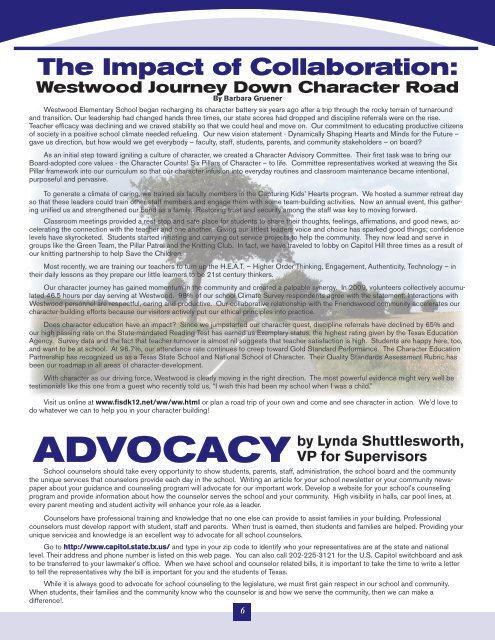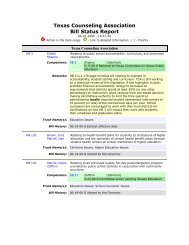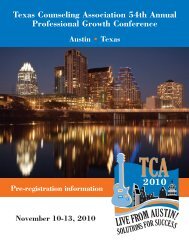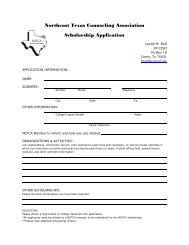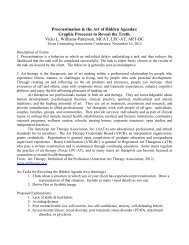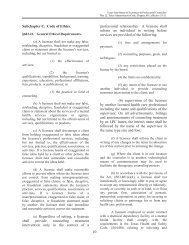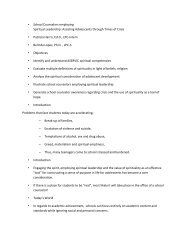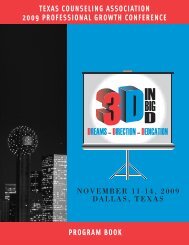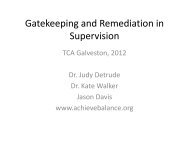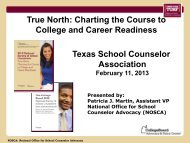Voice of the School Counselor - Texas Counseling Association
Voice of the School Counselor - Texas Counseling Association
Voice of the School Counselor - Texas Counseling Association
You also want an ePaper? Increase the reach of your titles
YUMPU automatically turns print PDFs into web optimized ePapers that Google loves.
The Impact <strong>of</strong> Collaboration:<br />
Westwood Journey Down Character Road<br />
By Barbara Gruener<br />
Westwood Elementary <strong>School</strong> began recharging its character battery six years ago after a trip through <strong>the</strong> rocky terrain <strong>of</strong> turnaround<br />
and transition. Our leadership had changed hands three times, our state scores had dropped and discipline referrals were on <strong>the</strong> rise.<br />
Teacher efficacy was declining and we craved stability so that we could heal and move on. Our commitment to educating productive citizens<br />
<strong>of</strong> society in a positive school climate needed refueling. Our new vision statement - Dynamically Shaping Hearts and Minds for <strong>the</strong> Future –<br />
gave us direction, but how would we get everybody – faculty, staff, students, parents, and community stakeholders – on board?<br />
As an initial step toward igniting a culture <strong>of</strong> character, we created a Character Advisory Committee. Their first task was to bring our<br />
Board-adopted core values - <strong>the</strong> Character Counts! Six Pillars <strong>of</strong> Character – to life. Committee representatives worked at weaving <strong>the</strong> Six<br />
Pillar framework into our curriculum so that our character infusion into everyday routines and classroom maintenance became intentional,<br />
purposeful and pervasive.<br />
To generate a climate <strong>of</strong> caring, we trained six faculty members in <strong>the</strong> Capturing Kids’ Hearts program. We hosted a summer retreat day<br />
so that <strong>the</strong>se leaders could train o<strong>the</strong>r staff members and engage <strong>the</strong>m with some team-building activities. Now an annual event, this ga<strong>the</strong>ring<br />
unified us and streng<strong>the</strong>ned our bond as a family. Restoring trust and security among <strong>the</strong> staff was key to moving forward.<br />
Classroom meetings provided a rest stop and safe place for students to share <strong>the</strong>ir thoughts, feelings, affirmations, and good news, accelerating<br />
<strong>the</strong> connection with <strong>the</strong> teacher and one ano<strong>the</strong>r. Giving our littlest leaders voice and choice has sparked good things; confidence<br />
levels have skyrocketed. Students started initiating and carrying out service projects to help <strong>the</strong> community. They now lead and serve in<br />
groups like <strong>the</strong> Green Team, <strong>the</strong> Pillar Patrol and <strong>the</strong> Knitting Club. In fact, we have traveled to lobby on Capitol Hill three times as a result <strong>of</strong><br />
our knitting partnership to help Save <strong>the</strong> Children.<br />
Most recently, we are training our teachers to turn up <strong>the</strong> H.E.A.T. – Higher Order Thinking, Engagement, Au<strong>the</strong>nticity, Technology – in<br />
<strong>the</strong>ir daily lessons as <strong>the</strong>y prepare our little learners to be 21st century thinkers.<br />
Our character journey has gained momentum in <strong>the</strong> community and created a palpable synergy. In 2009, volunteers collectively accumulated<br />
46.5 hours per day serving at Westwood. 98% <strong>of</strong> our school Climate Survey respondents agree with <strong>the</strong> statement: Interactions with<br />
Westwood personnel are respectful, caring and productive. Our collaborative relationship with <strong>the</strong> Friendswood community accelerates our<br />
character-building efforts because our visitors actively put our ethical principles into practice.<br />
Does character education have an impact? Since we jumpstarted our character quest, discipline referrals have declined by 65% and<br />
our high passing rate on <strong>the</strong> State-mandated Reading Test has earned us Exemplary status, <strong>the</strong> highest rating given by <strong>the</strong> <strong>Texas</strong> Education<br />
Agency. Survey data and <strong>the</strong> fact that teacher turnover is almost nil suggests that teacher satisfaction is high. Students are happy here, too,<br />
and want to be at school. At 96.7%, our attendance rate continues to creep toward Gold Standard Performance. The Character Education<br />
Partnership has recognized us as a <strong>Texas</strong> State <strong>School</strong> and National <strong>School</strong> <strong>of</strong> Character. Their Quality Standards Assessment Rubric has<br />
been our roadmap in all areas <strong>of</strong> character-development.<br />
With character as our driving force, Westwood is clearly moving in <strong>the</strong> right direction. The most powerful evidence might very well be<br />
testimonials like this one from a guest who recently told us, “I wish this had been my school when I was a child.”<br />
Visit us online at www.fisdk12.net/ww/ww.html or plan a road trip <strong>of</strong> your own and come and see character in action. We’d love to<br />
do whatever we can to help you in your character building!<br />
ADVOCACY<br />
<strong>School</strong> counselors should take every opportunity to show students, parents, staff, administration, <strong>the</strong> school board and <strong>the</strong> community<br />
<strong>the</strong> unique services that counselors provide each day in <strong>the</strong> school. Writing an article for your school newsletter or your community newspaper<br />
about your guidance and counseling program will advocate for our important work. Develop a website for your school’s counseling<br />
program and provide information about how <strong>the</strong> counselor serves <strong>the</strong> school and your community. High visibility in halls, car pool lines, at<br />
every parent meeting and student activity will enhance your role as a leader.<br />
by Lynda Shuttlesworth,<br />
VP for Supervisors<br />
<strong>Counselor</strong>s have pr<strong>of</strong>essional training and knowledge that no one else can provide to assist families in your building. Pr<strong>of</strong>essional<br />
counselors must develop rapport with student, staff and parents. When trust is earned, <strong>the</strong>n students and families are helped. Providing your<br />
unique services and knowledge is an excellent way to advocate for all school counselors.<br />
Go to http://www.capitol.state.tx.us/ and type in your zip code to identify who your representatives are at <strong>the</strong> state and national<br />
level. Their address and phone number is listed on this web page. You can also call 202-225-3121 for <strong>the</strong> U.S. Capitol switchboard and ask<br />
to be transferred to your lawmaker’s <strong>of</strong>fice. When we have school and counselor related bills, it is important to take <strong>the</strong> time to write a letter<br />
to tell <strong>the</strong> representatives why <strong>the</strong> bill is important for you and <strong>the</strong> students <strong>of</strong> <strong>Texas</strong>.<br />
While it is always good to advocate for school counseling to <strong>the</strong> legislature, we must first gain respect in our school and community.<br />
When students, <strong>the</strong>ir families and <strong>the</strong> community know who <strong>the</strong> counselor is and how we serve <strong>the</strong> community, <strong>the</strong>n we can make a<br />
difference!.<br />
Six Warning<br />
Signs that a<br />
Child is Being<br />
Bullied<br />
By Ted Zeff, Ph.D.<br />
Approximately 160,000 children miss school every day in <strong>the</strong> United States for fear <strong>of</strong> being bullied. More than 50 suicides have been linked<br />
to prolonged bullying. Approximately 85 percent <strong>of</strong> school shootings have revenge against bullies as a major motive. <strong>School</strong>-related bullying<br />
has led to depression and poor school performance in many children. The costs <strong>of</strong> bullying are high, but, unfortunately, many children suffer<br />
alone, keeping <strong>the</strong>ir experiences <strong>of</strong> being bullied to <strong>the</strong>mselves.<br />
Many children are taught that it is a sign <strong>of</strong> weakness to ask for help, and frequently fail to tell a parent or even a counselor or <strong>the</strong>rapist when<br />
<strong>the</strong>y are being bullied for fear <strong>of</strong> appearing weak. Many children feel shame and assume, “Something must be wrong with me. Why else<br />
would <strong>the</strong>y target me?”<br />
Children who are bullied are at risk for developing a number <strong>of</strong> emotional difficulties, including depression and anxiety symptoms. Children<br />
who are particularly traumatized may develop post-traumatic stress disorder (PTSD). PTSD is usually brought on by a terrifying physical or<br />
emotional event or series <strong>of</strong> events. Some <strong>of</strong> <strong>the</strong> symptoms <strong>of</strong> PTSD include trouble sleeping, withdrawal from normal activities, a lack <strong>of</strong> concentration,<br />
and emotional numbness. When children are suffering from PTSD, <strong>the</strong>y are prone to developing strong physical symptoms in situations<br />
where <strong>the</strong>y feel unsafe and in danger. They appear disconnected from o<strong>the</strong>rs, and <strong>the</strong>y may experience an intense physical response<br />
from <strong>the</strong>ir nervous system that can involve angry outbursts, jumpyness, and hyper alertness. This reaction is <strong>the</strong> nervous system’s response to<br />
potential danger, whe<strong>the</strong>r real or imagined, creating constriction and disassociation in order to protect <strong>the</strong> body.<br />
When children experience trauma, <strong>the</strong>y <strong>of</strong>ten become frozen and exhibit feelings <strong>of</strong> helplessness and shame, rendering <strong>the</strong>m nearly unable<br />
to defend <strong>the</strong>mselves when attacked or put under pressure. These traumatized children <strong>the</strong>n bring this frozen state <strong>of</strong> helplessness to many<br />
o<strong>the</strong>r situations that <strong>the</strong>y perceive as threatening throughout <strong>the</strong>ir lives. And, <strong>the</strong> more withdrawn <strong>the</strong>se children become, <strong>the</strong> more fearful and<br />
helpless <strong>the</strong>y feel, <strong>the</strong> stronger <strong>the</strong> likelihood that <strong>the</strong>y will slip into serious emotional trouble.<br />
Although children may experience depression, severe anxiety, or PTSD due to a variety <strong>of</strong> factors, frequently <strong>the</strong>se symptoms are related to<br />
school bullying. The following is a list <strong>of</strong> red flags that a child may be bullied:<br />
Is <strong>the</strong> child disconnecting from people and isolating him/herself in <strong>the</strong>ir room? Although teens usually separate from <strong>the</strong> family, <strong>the</strong>y normally<br />
connect more <strong>of</strong>ten with <strong>the</strong>ir friends.<br />
Has <strong>the</strong> child developed physical problems such as stomachaches and headaches that interfere with <strong>the</strong>ir life?<br />
Has <strong>the</strong> child’s schoolwork recently suffered, and is it difficult for <strong>the</strong> child to concentrate?<br />
Does <strong>the</strong> child have trouble falling or staying asleep or experience frequent nightmares?<br />
Does <strong>the</strong> child seem listless, unenthusiastic, and disinterested in life?<br />
Does <strong>the</strong> child seems hypervigilant, extremely nervous, depressed, or emotionally explosive (beyond <strong>the</strong> normal teenage angst and moodiness)?<br />
If <strong>the</strong> child is suffering from any <strong>of</strong> <strong>the</strong> above symptoms as a result <strong>of</strong> school bullying, it’s important to immediately intervene on many levels<br />
simultaneously with <strong>the</strong> child, parents, and school personnel.<br />
Dr. Ted Zeff is <strong>the</strong> author <strong>of</strong> The Strong, Sensitive Boy<br />
For more information please visit www.drtedzeff.com or <strong>the</strong> amazon.com book link: http://amzn.to/ciWRxa<br />
6 7


